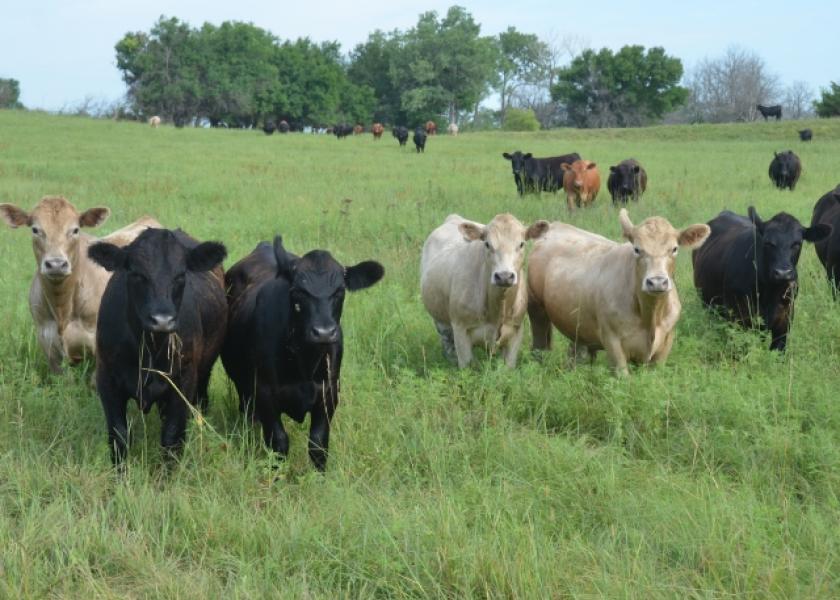Supplemental Feeding of Stockers Grazing Summer Grass

Gains of growing cattle grazing summer pasture in Oklahoma often do not meet expectations. Reduced performance or ‘Summer Slump’ is associated with decreasing forage quality during the late summer. Oklahoma State University developed the Oklahoma Gold and Oklahoma SuperGold supplementation programs to offset the reductions in protein and digestibility of the late summer forages.
The Oklahoma Gold program is based on feeding 1 pound per day (or 2.3 pounds/calf three times a week) of a high protein (38 to 40% protein) supplement containing an ionophore and required minerals and vitamins from mid July to the end of summer grazing. This supplement has been proven to increase daily gains by 0.4 to 0.5 pounds per day with supplement conversions of 2 to 2.5 pounds of feed per pound of added gain. This program is designed to meet the protein deficiency that occurs during the late summer, which increases forage digestibility and forage intake.
The Oklahoma SuperGold program is based on feeding 2.5 pounds per day (5.8 pounds/calf three times per week) of a 25% protein supplement containing an ionophore and vitamins and minerals. This supplement provides needed protein and additional energy in situations where calves have higher energy requirements, more gains are needed, and feed is relatively cheap compared to the value of added gain. The SuperGold program will increase gain by about 0.7 pounds per day with supplement conversions of 3.5 pounds of supplement per pound of added gain.
Recently a new extrusion technology has been developed to make a stable cube from dried distiller’s grains (DDG) that is moderate in crude protein and high in energy and is an ideal supplement meeting the needs of cattle during the late summer. A series of research trials is being conducted on native rangelands in western Oklahoma and introduced pastures in higher rainfall areas in the east.
On the western Oklahoma rangelands supplements were fed only during the late summer at 2 to 2.5 lbs per day similar to the Oklahoma SuperGold supplementation program. Supplementation during the late summer increased gains by over 1 pound per day from 1.8 lb/day to 2.9 lb/day at Fort Supply in northwest Oklahoma.
Fertilized bermudagrass pastures (50 lb N/ac) are often higher in quality than we see with late summer native pastures, so responses to supplementation may not be the same. Steers grazing these pastures and supplemented at 2.5/day gained 0.55 lbs/day more than controls throughout the summer, requiring 4.5 pounds of supplement per pound of added gain. In this same research, steers offered a self-fed molasses-based tub did not have improved average daily gains compared to negative controls.
Supplementation programs are beneficial for stockers grazing summer pastures. The best supplementation program depends on the economic relationship between the value of the calf’s gain and the cost of the inputs (fuel, fertilizer, and supplements).







